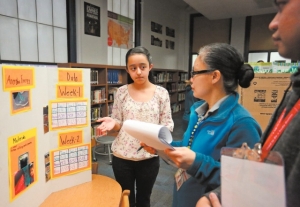Student-scientists vie for shot at regionals
By Steve Herring
Published in News on January 15, 2018 5:50 AM

News-Argus/CASEY MOZINGO
Evelyn Perez, sixth-grader at Mount Olive Middle, explains her anaerobic energy project to judges Patricia Velasco, science chair at Goldsboro High, and Jonas Almerino, science teacher at Goldsboro High, Saturday during the annual Wayne County Public Schools Science Fair. Evelyn and two of her friends ran the same distance every other day to see if their times increased or decreased over the span of two weeks.

News-Argus/CASEY MOZINGO
Michael Schroeder, Norwayne Middle sixth-grader, talks about his science fair project on aerodynamics in the media center at Goldsboro High School Saturday. He used incense to create smoke that was sucked through straws with a fan.
Hunter Miller enjoys energy drinks.
But he got to wondering what kind of effect the drinks were having on his body -- an idea he turned into a science fair project using water fleas.
Miller, a junior at Charles B. Aycock High School, won at the school level and Saturday was competing against other high school students at the Wayne County Public Schools annual science fair held in the Goldsboro High School media center.
Miller and his project partner, Sophia Bray, sophomore, who could not be at the fair, won first place in Biological Sciences A (animal science, medicine and health sciences and microbiology).
The event was to have been held earlier in the month, but was rescheduled because of the snow.
The 13 winners from Saturday -- representing high school, middle school and elementary school students -- will represent Wayne County Public Schools at the N.C. Southeast Regional Science Fair at UNC Wilmington.
Miller and Bray's original idea was to test the effect of caffeine on the water fleas. However, since it was going to take so long to receive an order of pure caffeine, they switched to energy drinks which are a significant source of caffeine.
Also, the drinks are very popular with teenagers, young adults, he said.
Using water slides and a microscope, Miller and Bray were able to calculate the water fleas' heartbeat.
"We would put them in the water first just to get their average pulse rate," he said. "Then, after that, we would get the energy drink and calculate their average pulse rate.
"We had to dilute the energy drink because the first time we did it their heartbeat, it was uncountable. It was far to fast and shortly afterward they died. So we would dilute each energy drink by 50 percent."
The solution had a significant impact on the heartbeats, he said.
The takeaway was that the drinks have a significant impact on heart beats and that people need to watch how much they drink in one sitting, he said.
Andy Forsleff, Wayne County Public Schools lead science teacher, said he wanted to try that experiment himself.
"I am afraid that, with having to reschedule this again, I know that a lot of kids dropped out because they had other things to do," said Forsleff, who was in charge of the event. "I lost a lot of teacher judges, too, because they had scheduled around this.
"Our biggest group is the middle school. They are really into the science fair. With high school schedules it is kind of tough for teachers to work it out."
The schools each hold their own science fair, and the winners advance to the countywide event.
"The winner from here will go to the regional science fair at UNC-Wilmington next month," he said. "Then winners from there go to the state.
"We have never had anybody go past state, but we have had a few people get to the state one. It is at Meredith College (in Raleigh)."
Despite the turnout, there were a number of very interesting entries, Forsleff said.
"And they make it personal," he said. "One girl, she did an experiment with dogs. What is better reinforcement for good behavior -- praise, or food -- because she has dogs at home. A lot of those behavioral things bleed off into human behavior, too.
"Do people prefer praise or food, or money, I guess it would be. What is more palatable. Good ideas."
Forsleff, a teacher at Dillard Middle School, said the science fair is a treat for him since he gets to see students who are the cream of the crop and who love science.
He is in his fifth year with the science fair, but he has been a judge for 14 years.
Science fairs are an important part of a student's education, he said.
"The way the curriculum looks, science teachers complain that it is a mile wide and an inch deep," he said. "You have to cover all of these standards so kids can do well on the test at the end of the year. But you don't have time to get in depth on any one subject.
"But when you do a science project, you really get to dive deep, and that, I think, is a whole lot more rewarding to the kids, and it is going to stick with them."
Forsleff said he still remembers his fifth-grade science fair project on nuclear power.
"It stuck with me because I got deep into it," he said.
